#Literature Tutor
Explore tagged Tumblr posts
Text
Didn't think I'd be here again, but hello friends, and welcome back to another round of Bad-Faith Engagement! This time with a comment on this post by the lovely @jiangwanyinscatmom. Strap in folks, cause this one's a doozy.
Let’s start with the original post:
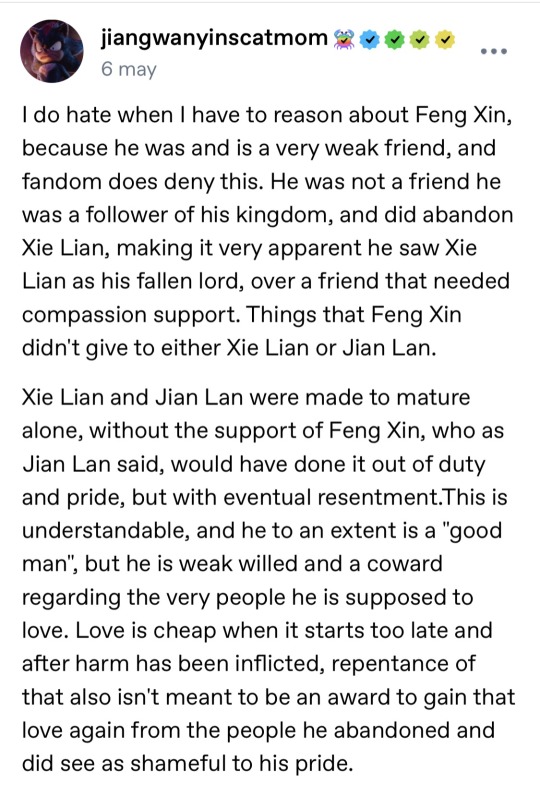
In this post, Orion says that Feng Xin is a weak friend because:
He was not a friend but a follower
He abandoned Xie Lian because he saw Xie Lian as his “fallen lord”
A challenger then enters the ring, “compelled” to argue in Feng Xin’s defense. What are their defenses? Feng Xin is not a weak friend because:
He promises to never leave Xie Lian after Mu Qing abandons them
The queen says that Feng Xin still held affection for Xie Lian
Yes Feng Xin did, in fact, abandon Xie Lian, but it’s only because Xie Lian told him to “stop following” and he can’t conceive of himself as not being a follower, otherwise, he “never conceived of leaving”
Feng Xin loves Xie Lian as a friend
Read this list, then reread Orion’s post and count how many of the challenger's points correlate to an argument Orion made. If you said “one” (or one and a half), then you are correct! Only the challenger’s first point—“Feng Xin promises to never leave Xie Lian”—and the third point which feeds off of the first could serve as a rebuttal to a point that Orion actually made—“Feng Xin abandons Xie Lian.” Therefore, I will not be addressing the second and fourth points—Feng Xin held genuine affection for Xie Lian”—because that is not an argument Orion ever made, thus, they do not need to be addressed. However, this is when it starts to get… messy.
Can you spot the contradiction? If you said the challenger’s first and third points, again, then give yourself a pat on the back! The challenger initially argued that Feng Xin saying that he would never leave Xie Lian means that he is not a weak friend, but then when they acknowledge that Feng Xin did, in fact, leave Xie Lian, breaking his promise, they try to argue that this is, in fact, Xie Lian’s fault for telling him “not to follow.” They claim that, had Xie Lian not “told him to leave” (which is not an accurate statement, but that is for another day), then Feng Xin would have not even conceived of abandoning his friend. They also claim that the 800 years in which Feng Xin did not speak or seek Xie Lian out was “on Xie Lian’s terms.” However, their own screenshotted evidence betrays them:
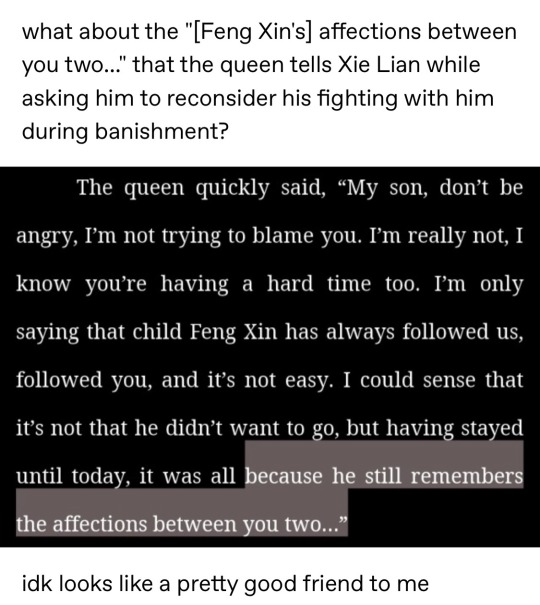
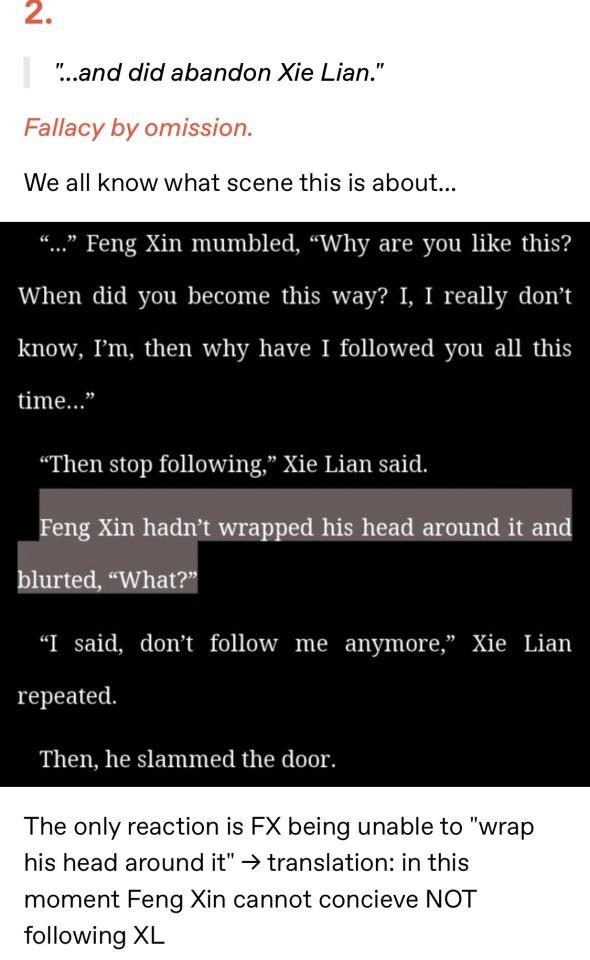
In the first screenshot, read the sentence right before the challenger’s highlight. The queen says, “I could sense that it’s not that he didn’t want to go…” which means that Feng Xin did, in fact, want to leave and that it was pretty obvious that he stayed only because of old affection, not because he “couldn’t conceive of leaving.” In the second screenshot, Feng Xin is questioning his loyalty, once again, in the section right before the challenger’s highlight, proving that he is capable of and willing to question his loyalty to his friend, that he does not see it as loyalty to “a friend” but to a superior. This is what Xie Lian is addressing with his "stop following" comment, but if one only reads the highlights and the challenger’s “explanations,” you would miss this very simple acknowledgment on Feng Xin from both he and the queen. In no except does Xie Lian explicitly tell Feng Xin to leave, nor does he tell Feng Xin to never seek him out or contact him again. When they meet again 800 years later, Feng Xin has no issue seeking a newly re-ascended Xie Lian out, then, even when Xie Lian didn’t seek him out. The challenger even has the audacity to call this a “fallacy of omission” that Orion would claim that Feng Xin left of his own desire, despite the fact that the cherry-picked segments they provided as evidence clearly prove Orion’s point. And it gets worse.
Continuing on this “fallacy of omission” argument, the challenger brings onto the field this piece of evidence as "proof" that the miscommunication between Feng Xin and Xie Lian is that Xie Lian feels like Feng Xin needs to be compensated but that Feng Xin “doesn’t think Xie Lian needs to compensate him anymore”:
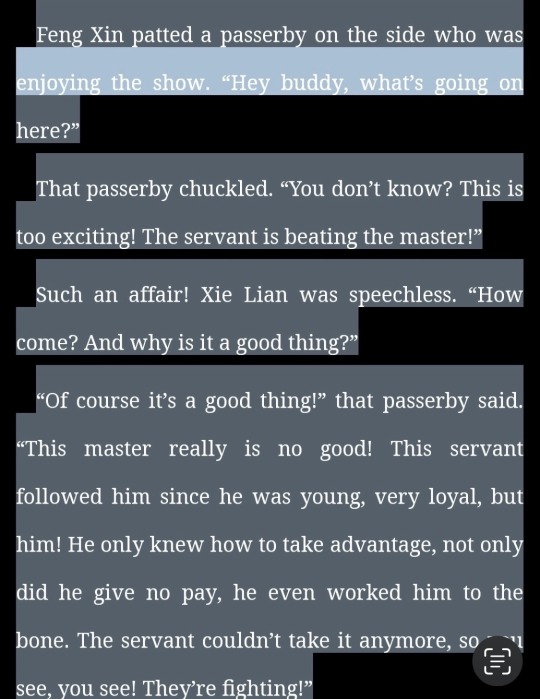
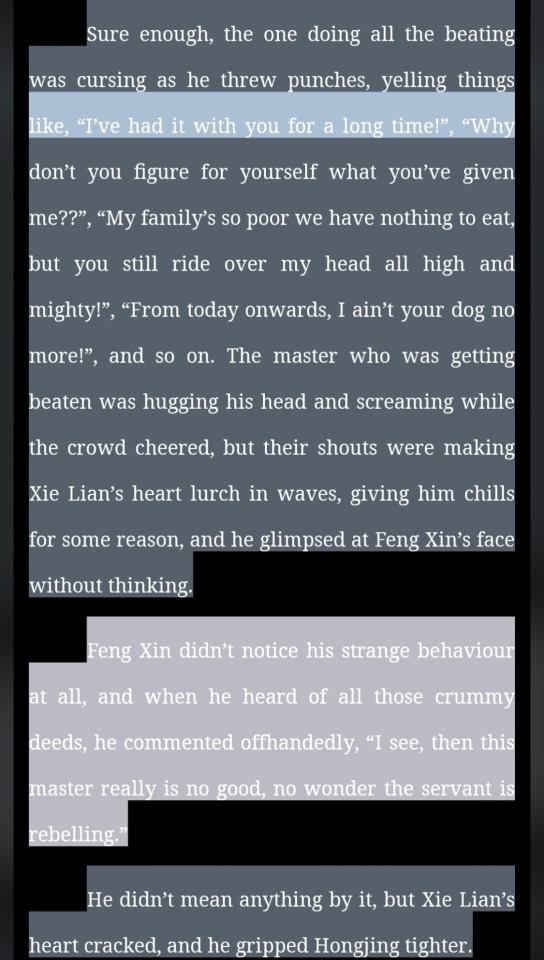
However, what the challenger, themself, strangely omits is that Feng Xin does indeed ask for compensation after this:
Now that the subject was raised, Feng Xin hesitated again. After a pause, he opened his mouth, hemming and hawing and scratching at his head as he stammered out, “Actually, it’s... Your Highness, do you still have any money on you? Or something that can be pawned?” Xie Lian was perplexed that he’d ask such a foolish question at a time like this. “Huh? Why do you ask?” Feng Xin was sweating, but he replied boldly, “It’s nothing... Just... If you happen to have some, can you...lend it to me?” Xie Lian laughed bitterly. “Do you really think I have anything?” Feng Xin sighed. “I didn’t think so.” After giving it some thought, Xie Lian asked, “Didn’t I give you that golden belt?” “That’s not enough,” Feng Xin mumbled. “Far from it...” Xie Lian was shocked. “Feng Xin? What exactly did you do? How could a golden belt not be enough to cover whatever you need? Did you beat someone up and need to pay them off? Tell me?” Feng Xin came back to himself and quickly said, “Oh no! Don’t take this to heart. I was only asking!” Xie Lian pressed him over and over, but Feng Xin still swore everything was fine. Finally, Xie Lian said with worry, “Well, if there’s anything, you must tell me. We can think of a solution together.” “Don’t worry about me,” Feng Xin said. “There’s no way a solution will just fall from the sky. Your Highness, you just focus on solving your own problems!” When he mentioned that topic, Xie Lian’s heart sank again.
—Vol. 6, Chapt. 98: Warm Words of a Cold Ghost Beguile the Lost Child, 7seas
He initially rejects the valuables Xie Lian tries to give him, only to circle back around later to ask for them to sell for what we now know was to buy time with Jian Lan. Xie Lian even offers to help him solve it "together," but Feng Xin brushes him off. To claim that Xie Lian believed that he owed Feng Xin out of simple “miscommunication”—because Feng Xin was simply too pure and loyal to conceive of asking Xie Lian for money—is a wild misconstruing of both this scene and the fractures in the pair’s relationship.
The challenger also takes issue with Orion’s use of the word coward, for which they are bold enough to pull up a dictionary to ��disprove” the description:
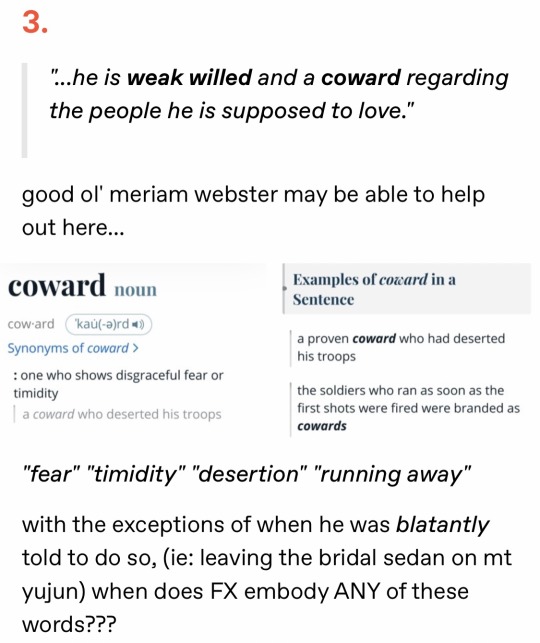
Despite the last two definitions that they pulled matching the description of actions they have acknowledged Feng Xin as having committed, they claim that “coward” is not a characteristic that Feng Xin embodies because… they say it isn’t. But do they really? Finally, my last piece to be deconstructed, the last three paragraphs of this poorly managed “meta”:
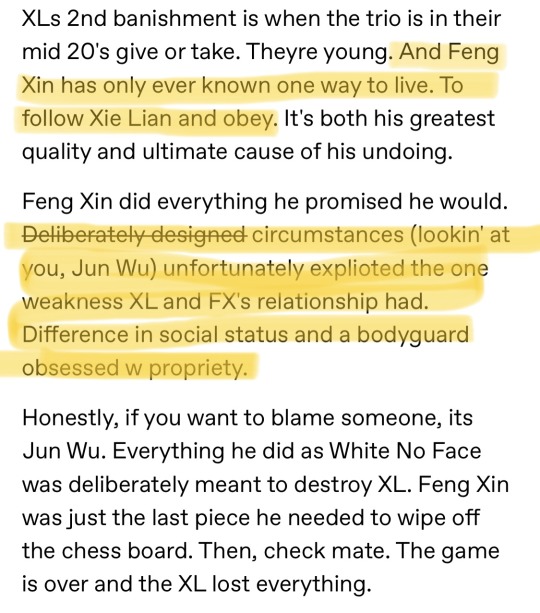
Let’s recap: Orion’s reasoning for saying that Feng Xin was a “weak friend” were:
He was not a friend but a follower
He abandoned Xie Lian because he saw Xie Lian as his “fallen lord”
The challenger states these very points as their closing argument, as clearly shown in the highlights. So if they agreed with Orion, why make such a condescending “meta” about how Orion is wrong about all of their points, just to restate them as their own conclusion? Simple: it’s not that the challenger disagrees with Orion, at all; it's that they disagree with Orion's non-sympathy for Feng Xin. Feng Xin did leave Xie Lian, "but it wasn't his fault." Feng Xin did break his promise, "but it wasn't his fault." They believe that if a character must be faulted for Feng Xin’s behaviors and actions, then it must be someone else rather than the character (Feng Xin) committing to those actions, themself. Because Jun Wu is the ultimate villain of the novel, then he must be at fault for Feng Xin’s abandonment, and it is not “cowardice” or “desertion” or “fleeing” because had things not gotten tough, obviously Feng Xin would have stayed. “Weak” is simply too harsh a critique of a fair-weather friend, even if it is, in fact, true.
And there you have it, folks! Tune in for long enough, and maybe I’ll have an svsss lesson to complete this stunning trilogy!
#tgcf#i can give y'all free literature and critical thinking lessons#because y'all are my followers and mutuals and i love y'all#anyone else on this clown's wavelength can pay me to tutor them at a later date
43 notes
·
View notes
Text
Highlight of my highschool experience was the literature matura.
I was seated exactly behind someone I'd never seen before in my life, and we were all chatting about what the mock matura was on. Turned out the two of us had the exact same mock matura, which was unusual. Within the next few sentences, it turned out we were actually in the same year at the same school, just in different classes, so we never really interacted.
Apparently the guy was popular and he was genuinely appalled I didn't know who he was. The other people in the room were also appalled we didn't know each other.
#zdr Chichaka ili kakto beshe tam ako chetesh tova vse oshte ne me ebe koi si i se nadqvam da e zabolqlo pone malko che ne ta znam <3#p: mine#2nd highlight: I got a score that's 0.02 points higher than my literature tutor's daughter (who was a cunt) so I got to rub that in
10 notes
·
View notes
Text
“A college education is a fine thing to work for,” he finally commented. “You have high goals; they’re worth pursuing. They’re worth the struggle to achieve. Do yourself… and me… a favor: don’t give up on them when it gets hard, because it will get hard. Swallow your pride as often as it takes, and be humble enough to seek help—tutoring, additional instruction, study partners… that sort of thing. The sooner the better. I promise you it will help.”
― Richelle E. Goodrich, Being Bold: Quotes, Poetry, & Motivations for Every Day of the Year
#richelle e. goodrich#richelle e goodrich#richelle goodrich#richellegoodrich.com#author#writer#novelist#poet#books#Being Bold#books on Amazon#books to read#books and reading#literature#book quotes#life quotes#quotes#daily quotes#readers#reading community#book lovers#bookworms#education#tutoring#goals#educational goals#college#college education
3 notes
·
View notes
Text
exam season is around the corner for my kids - guess who's putting their smart hat on?
#i tutor 2/3 things#and they come w 6 rkskvjekc#like ty for thinking i'm smart#but i have no idea how math and geography works#much less chemistry and physics#i studied languages and literature for a reason ekdjjdosic
3 notes
·
View notes
Text
You think Fettes and Macfarlane ever explored each others body's.
#the body snatcher#robert louis stevenson#gothic literature#gothic horror#voices from the other side#i think wolfe was fettes first gay situationship and he was an awful tutor#but only because wolfe's first experience was with gray and hes worse
3 notes
·
View notes
Text
october 18th
today's spooky poem is neil gaiman's "vampire sestina", featured in the collection "smoke and mirrors". as any poet will tell you, a sestina is a fiendishly tricky beast, so i'm always impressed when i find a good one - and this is, i think, a good one! you can read a little more about sestinas here, and if you've got some free time on your hands, you might try your hand at writing your own. (well, why not?)
VAMPIRE SESTINA
I wait here at the boundaries of dream, All shadow-wrapped. The dark air tastes of night, So cold and crisp, and I wait for my love. The moon has bleached the color from her stone. She'll come, and then we'll stalk this pretty world Alive to darkness and the tang of blood.
It is a lonely game, the quest for blood. But still, a body's got the right to dream And I'd not give it up for all the world. The moon has leeched the darkness from the night. I stand in the shadows, staring at her stone: Undead, my lover... O, undead my love?
I dreamt you while I slept today and love Meant more to me than life - meant more than blood. The sunlight sought me, deep beneath my stone, More dead than my corpse but still a-dream Until I woke as vapor into the night And sunset forced me out into the world.
For many centuries I've walked the world Dispensing something that resembled love - A stolen kiss, then back into the night Contented by the life and by the blood. And come the morning I was just a dream, Cold body chilling underneath a stone.
I said I would not hurt you. Am I stone To leave you prey to time and to the world? I offered you a truth beyond your dreams While all you had to offer was your love. I told you not to worry and that blood Tastes sweeter on the wing and late at night.
Sometimes my lovers rise to walk the night... Sometimes they lie, cold corpse beneath the stone, And never know the joys of bed and blood, Of walking through the shadows of the world; Instead they rot to maggots. O my love They whispered you had risen, in my dream.
I've waited by your stone for half the night But you won't leave your dream to hunt for blood. Good night, my love. I offered you the world.
—Neil Gaiman
#october poems#fun fact when i was in undergrad we had a tutor who HATED sestinas. hated em.#one of his big rules when he handed out poetry assignments was NO SESTINAS#which is of course the best way to ensure that every student in your class will at some point write you a sestina#never underestimate the bloody-mindedness of english literature students
33 notes
·
View notes
Text
Angry at parents hour!
Undiagnosed autistic fuckers are delulu.
#headline descriptor plus rant in tags#oh yeah sure sibling could have#sat down and studied for his finals#if only he wanted to#bitch you sent him to a school that did not have a special education program#you have been told he has learning difficulties#you didn’t get him diagnosed#you failed at providing him adequate help and tutoring#and yes that was on you because you sent him to a school that wouldn’t do that proactively#on purpose#so they wouldn’t bother you#oh but he is so smart and holds enceclapidic knowledge of d&d and Pokémon in his mind#that doesn’t translate to studying skills and ability to write out his thoughts and you know it#fuck you some things are your fault#and your responsibility as a parent#and now you couldn’t adequately provide education support to your youngest child for three years in a row#even though it’s your fourth autistic kid#you knew the signs damn well#and don’t get me started on dad#he just straight up doesn’t contribute anything to the conversation unless it’s about something that interesting to him#I don’t think you get to do that as a parent?#in the 21 century at least#why the fuck do I never know this man’s opinion on anything except music and fantasy series?#the kicker is those two know damn well you need support to grow in a meaningful way as an autistic child and young person#they were autistic children and young people#they have had support#they have had other people’s input#they had support beside irrelevant literature presented without explanation and advice to check the web#where the fuck did they get the idea that a person related to both of them is able to sit down and study without external support and#or a meaningful structure
4 notes
·
View notes
Note
What job (I’m nosy)
if they offer it to me, academic mentoring in english literature !!
#basically tutoring small groups of students at a secondary school who need additional help with literature#so i get to be a literature teacher without handling entire classrooms of teenagers haha
7 notes
·
View notes
Text
she wouldn’t in a canon timeline, but in the 21st century Vicki would absolutely go back for at least her undergrad, if not her masters.
#like in canon i think she does study with Liz / prof stokes / julia because she loves to learn and she has that student’s blood in her#history with liz; science with Julia; metaphysics with stokes; drama and literature with Roger#mechanics and tide charts with David lmao.#she Needs someone to study French with.#hc tag#➤ victoria winters. ┊ because she’s lost and lonely. because she looks in shadows.#but I do love the idea of Liz paying for her to go back to school#not necessarily to make a better tutor for David - even maybe after David has gone to school#just because it’s always something she wanted to do but it’s not something she was ever in a position to do#and liz and rog (and Julia et all) all have that college education so she’s a little bit of an outsider in that regard
4 notes
·
View notes
Text
Nicholas C Nelson - A Lecturer
issuu
Nicholas C. Nelson, a lecturer at the University of Miami, blends his expertise in English Literature with hands-on experience as a former tutor at the writing center. His innovative teaching methods and genuine passion for literature have enriched Miami's academic landscape and nurtured a generation of critical thinkers and avid readers.
2 notes
·
View notes
Text




My final book haul of the summer! ✨👏
#nier automata#remarried empress#fourth wing#the tyrant's etiquette tutor#books#manhwa#novels#literature#life#just me
2 notes
·
View notes
Text
i appreciated this study: "They Can't Read Very Well: A Study of the Reading Comprehension Skills Of English Majors At Two Midwestern Universities"
[ETA: if you are somehow finding your way here pls note some - not exhaustive!!!! - follow up notes in this reblog. sorry again i mixed up megalodons and megalosaurs]
essentially, a pair of professors set out to test their intuitive sense that students at the college level were struggling with complex text. they recruited 85 students, a mix of english majors and english education majors - so, theoretically, people focusing on literature, and people preparing to teach adolescents how to read literature - and had them read-while-summarizing the first seven paragraphs of dickens's bleak house (or as much as they made it through in the 20 minute session). they provided dictionaries and also said students could use their phones to look up whatever they wanted, including any unfamiliar words or references. they found that the majority of the students - 58%, or 49 out of the 85 students - functionally could not understand dickens at all, and only 5% - a mere 4 out of the 85 students - proved themselves proficient readers (leaving the remaining 38%, or 32 students, as what the study authors deemed "competent" students, most of whom could understand about half the literal meaning - pretty low bar for competence - although a few of whom, they note, did much better than the rest in this group if not quite well enough to be considered proficient).
what i really appreciated about this study was its qualitative descriptions of the challenges and reading behaviors of what the authors call "problematic readers" (that bottom 58%), which resonated strongly with my own experiences of students who struggle with reading. here's their blunt big picture overview of these 49 students:
The majority of these subjects could understand very little of Bleak House and did not have effective reading tactics. All had so much trouble comprehending concrete detail in consecutive clauses and phrases that they could not link the meaning of one sentence to the next. Although it was clear that these subjects did try to use various tactics while they read the passage, they were not able to use those tactics successfully. For example, 43 percent of the problematic readers tried to look up words they did not understand, but only five percent were able to look up the meaning of a word and place it back correctly into a sentence. The subjects frequently looked up a word they did not know, realized that they did not understand the sentence the word had come from, and skipped translating the sentence altogether.
the idea that they had so much trouble with every small piece of a text that they could not connect ideas on a sentence by sentence basis is very familiar to me from teaching and tutoring, as was the habit of thought seen in the example of the student who gloms on to the word "whiskers" in a sea of confusion and guesses incorrectly that a cat is present - struggling readers, in my experience, seem to use familiar nouns as stepping stones in a flood of overwhelm, hopping as best they can from one seemingly familiar image to the next. so was this observation, building off the example of a student who misses the fact that dickens is being figurative when he imagines a megalodon stalking the streets of london:
She first guesses that the dinosaur is just “bones” and then is stuck stating that the bones are “waddling, um, all up the hill” because she can see that Dickens has the dinosaur moving. Because she cannot logically tie the ideas together, she just leaves her interpretation as is and goes on to the next sentence. Like this subject, most of the problematic readers were not concerned if their literal translations of Bleak House were not coherent, so obvious logical errors never seemed to affect them. In fact, none of the readers in this category ever questioned their own interpretations of figures of speech, no matter how irrational the results. Worse, their inability to understand figurative language was constant, even though most of the subjects had spent at least two years in literature classes that discussed figures of speech. Some could correctly identify a figure of speech, and even explain its use in a sentence, but correct responses were inconsistent and haphazard. None of the problematic readers showed any evidence that they could read recursively or fix previous errors in comprehension. They would stick to their reading tactics even if they were unhappy with the results.
i have seen this repeatedly, too - actually i was particularly taken with how similar this is to the behavior of struggling readers at much younger ages - and would summarize the hypothesis i have forged over time as: struggling readers do not expect what they read to make sense. my hypothesis for why this is the case is that their reading deficits were not attended to or remediated adequately early enough, and so, in their formative years - the early to mid elementary grades - they spent a lot of time "reading" things that did not make sense to them - in fact they spent much more time doing this than they ever did reading things that did make sense to them - and so they did not internalize a meaningful subjective sense of what it feels like to actually read things.
like, i've said this before, but the year i taught third grade i had multiple students who told me they loved reading and then when i asked them about a book they were reading revealed that they had absolutely no idea what was going on - on a really basic literal level like "didn't know who said which lines of dialogue" and "couldn't identify which things or characters given pronouns referred to" - and were as best as i could tell sort of constructing their own story along the way using these little bits of things they thought they understood. that's what "reading" was, in their heads. and they were, in the curriculum/model that we used at the private school where i taught, receiving basically no support to clarify that that was not what reading was, nor any instruction that would actually help them with what they needed to do to improve (understand sentences) - and i realized over the course of that year that the master's program that had certified me in teaching elementary school had provided me with very little understanding of how to help these kids (with perhaps the sole exception of the class i took on communications disorders, not because these kids had communications disorders but because that was the only class where we ever talked, even briefly, about things like sentence structures that students may need instruction in and practice with to comprehend independently). when it comes to the literal, basic understanding of a text, the model of reading pedagogy i was taught has about 6 million little "tools" that all boil down to telling kids who functionally can't read to try harder to read. this is not productive, in my experience and opinion, for kids whose maximum effort persistently yields confusion. but things are so dysfunctional all the way up and down the ladder that you can be a senior in college majoring in english without anyone but a pair of professors with a strong work ethic noticing that you can't actually read.
couple other notes:
obviously it's a small study but i'm not sure i see a reason to believe these are particularly outlierish results (ACT scores - an imperfect metric but not a meritless one IMO for reading specifically, where the task mostly really is to read a set of texts written for the educated layperson and answer factual questions about them - were a little bit above the national average)
the study was published last year, but the research was conducted january to april 2015. so there's no pandemic influence, no AI issue - these are millennials who now would span roughly ages 28-32 (i guess it's possible one of the four first-year students was one of the very first members of gen z lol). if you're in your late 20s or early 30s, we are talking about people your age, and whatever the culprit is here, it was happening when you were in school.
i think some people might want to blame this on NCLB but i find this unconvincing for a variety of reasons. first of all, NCLB did not pass because everyone in 2001 agreed that education was super hunky-dory; in fact, the sold a story podcast outlines how an explicit goal of NCLB was to train teachers in systematic phonics instruction, because that was not the norm when NCLB was passed, and an unfortunate outcome was that phonics became politicized in ed world. second, anyone who understands anything about reading should need about ten minutes max to spend some time on standardized test prep and recognize that if your goal is truly to maximize scores... then the vast majority of your instructional time should be spent on improving actual reading skills because you actually can't meaningfully game these tests by "practicing main idea questions" (timothy shanahan addresses this briefly near the top of this post). so i find it very difficult to believe that any school that pivoted to multiple choice drill time in an attempt to boost reading scores was teaching reading effectively pre-NCLB, because no set of competent literacy professionals would think that would work even for the goal of raising test scores. third, NCLB mandated yearly testing in grades 3-8 but only one test year in high school; kansas set its reading and math test year in high school as tenth grade. so theoretically these kids all had two years of sweet sweet freedom from NCLB in which their teachers could have done whatever the fuck they wanted to teach these kids to actually read. the fact that they didn't suggests perhaps there were other problems afoot. fourth, and maybe most saliently for this particular study, the sample text was the first seven paragraphs of a novel - in other words, the exact kind of short incomplete text that NCLB allegedly demanded excessive time spent on. i'm not really sure what universe it makes sense in that students who can't read the first seven paragraphs of a novel would have become much better reader if everything else had been the same but they had been making completely wack associations based on nonsense guesses for all 300 pages instead. (if you read the study it's really clear that for problematic readers, things go off the rails immediately, in a way that a good program targeted at teaching mastery of text of 500 words or less would have done something about.)
all but 3 of the students reported A's and B's in their english classes and, again, 69% of them are juniors and seniors, so like... i mean idk kudos to these professors for being like "hold up can these kids actually read?" but clearly something is wack at the college level too [in 2015] if you can make your way through nearly an entire english major without being able to read the first seven paragraphs of a dickens novel. (once again i really do encourage you to look at the qualitative samples in the study, lest you think i am being uncharitable by summarizing understandable misunderstandings or areas of confusion that may resolve themselves with further exposure to the text as "can't read.") not to mention the fact that most students could not what they had learned in previous or current english classes and when asked to name british and american authors and/or works of the nineteenth century, roughly half the sample at each college could name at most one.
the authors of the study are struck by the fact that students who cannot parse the first 3 sentences of bleak house feel very confident about their ability to read the entire novel, and discover that this seeming disconnect is resolved by the fact that these students seem to conceptualize "reading" as "skimming and then reading sparknotes." i think it's really tempting to Kids These Days this phenomenon (although again these are people who in some cases have now been in the workforce for a decade) and categorize it as laziness or a lack of effort, but i think that there is, as i described above, a real and sincere confusion over what "reading" is in which this makes a certain logical sense because it's not like they have some store of actual reading experiences to compare it to. i also think it's pretty obvious looking at just how wildly severed from actual textual comprehension their readings are that these are not - or at least not entirely - students who could just work harder and master the entirety of bleak house all on their own. like i don't think you get from "charles dickens is describing a bunch of dinosaur bones actually walking the streets of london" to comfortably reading nineteenth century literature by just trying harder. i really just don't (and i say that acknowledging i personally have had students who like... were good readers if i was forcing them to work at it constantly... but i have also had students, including ones getting ready to enter college, who were clearly giving me everything they had and what they had was at the present moment insufficient). i think that speaks to a missing skillset that they don't know are missing, because they don't have any other experience of "reading" to compare it to.
just wanna highlight again that although they don't give the breakdown some of these students are not just english majors but english education majors a.k.a. the high school english teachers of tomorrow. some of them may be teaching high school english right now, in case anyone wishes to consider whether "maybe some high school english teachers can't read the first seven paragraphs of bleak house?" should be kept in mind when we discuss present-day educational ills.
15K notes
·
View notes
Text
Digital diary 2025.05.02.
I organise/wrote down my ideas for Romeo and Juliet alternative. I went to math tutoring. At home I wrote down my history exam topics. Tomorrow I will have trial math exam to prepare me and my classmates for the real graduation math exam and i will go shopping with my mom for graduation. I will make it fast as I can because, i have to write down the other history exam topics and study for literature/grammar graduation exams on Monday.
Feeling: Super Stressed 😣
#math tutoring#writing#writers on tumblr#history homework#math class#math exam#shopping#literature studyblr#grammarstudy
0 notes
Text
Catch me outside writing a Rape of Lucrece allegory instead of finishing WDTTY
#the English literature graduate in me lives on#I don’t know if writing royjamie fanfic is what my tutors had in mind when they were talking about appreciating the text
0 notes
Text
Currently tutoring a third-grade kid and boy do I despise working with elementary school children
0 notes
Text
rolling around and flailing my arms can uni start again i want to write my gay little space stories
#I'M LIKE#TRYING TO APPLY FOR SOME LITERATURE TUTOR JOBS#AND ONE OF THEM IS ASKING ME TO WRITE A COUPLE OF ESSAYS#OFC I TOOK GATSBY UP W TWO OTHER OLD LIT BOOKS AND DRAMAS#BUT MANNNNNNNNNNNNNNNNNN I'M GETTING SO MUCH INSPIRATION TO GO BACK TO MY HSRXGATSBY FIC#FAAAAAAAAAAAAK CAN UNI STAAAAAAAAAAAART I WANT A REASON TO WRITE#BC RN ALL I DO IN MY FREE TIME IS PLAY THE FUCKING SIMS#and space game itself#LIKE#I WANT TO WRITE#BUT ALSO I WANT TO PLAY MY STUPID VIDEO GAMES#:/#agni yaps#hashtag writer problems ? i guess ?
0 notes